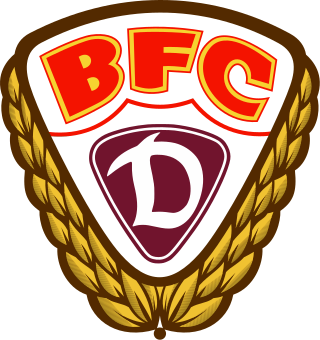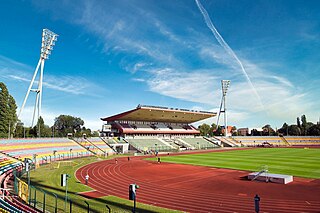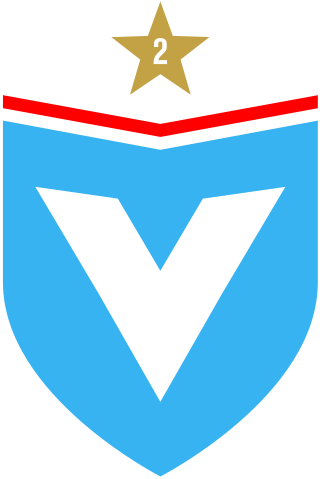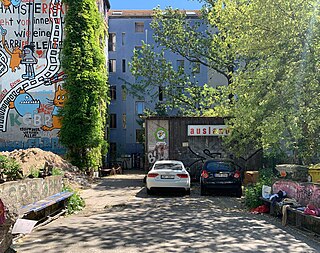Related Research Articles

Prenzlauer Berg is a locality of Berlin, forming the southerly and most urban district of the borough of Pankow. From its founding in 1920 until 2001, Prenzlauer Berg was a district of Berlin in its own right. However, that year it was incorporated into the greater district of Pankow.

Ernst Knaack was a German Communist and resistance fighter against the Nazi Germany régime.

Berliner Fussball Club Dynamo e. V., commonly abbreviated to BFC Dynamo or BFC, alternatively sometimes called Dynamo Berlin, is a German football club based in the locality of Alt-Hohenschönhausen of the borough of Lichtenberg of Berlin.

Weißensee is a quarter in the borough of Pankow in Berlin, Germany, that takes its name from the small lake Weißer See within it. Before Berlin's 2001 administrative reform, Weißensee was a borough in its own right, consisting of the quarters of Weißensee, Heinersdorf, Blankenburg, Karow, and Stadtrandsiedlung Malchow. A fictional German-language TV series by the same name is set in the borough between 1980 and 1990 during the communist era.

Max-Schmeling-Halle is a multi-purpose arena, in Berlin, Germany, named after the famous German boxer Max Schmeling. Apart from Uber Arena and the Velodrom, it's one of Berlin's biggest indoor sports arenas and holds from 8,861 people, up to 12,000 people.

The Velodrom (velodrome) is an indoor track cycling arena, in the Prenzlauer Berg locality of Berlin, Germany. Holding up to 12,000 people, it was also Berlin's largest concert venue, until the opening of O2 World in 2008.

Naturkundemuseum, formerly Zinnowitzer Straße, is a Berlin U-Bahn station located on the U6 in the district Mitte.

The Kopenhagener Straße is a street in Berlin's Prenzlauer Berg district, which runs parallel to the Ringbahn tracks between busy Schönhauser Allee in the east all the way to the Mauerpark in the west, where the Berlin Wall separated the Soviet from the French sector. The street was named on 30 April 1899 after the Danish capital Copenhagen.

The Friedrich-Ludwig-Jahn-Sportpark is a multi-purpose sports complex located in the western part of the locality of Prenzlauer Berg in the borough of Pankow in Berlin. The sports complex covers an area of approximately 22 hectares and comprises several facilities. The main building is the Friedrich-Ludwig-Jahn-Stadion. The stadium is the third-largest stadium in Berlin, after the Olympiastadion and the Stadion An der Alten Försterei, with a capacity of approximately 20,000 seats, of which 15,000 are covered. The most recent main tenants of the stadium have been VSG Altglienicke and Berlin Thunder. Friedrich-Ludwig-Jahn-Sportpark was the venue for the 2018 World Para Athletics European Championships. The large stadium is planned for a complete redevelopment. Demolition of the stadium began on 8 October 2024.

Mauerpark is a public linear park in Berlin's Prenzlauer Berg district. The name translates to "Wall Park", referring to its status as a former part of the Berlin Wall and its Death Strip. The park is located at the border of Prenzlauer Berg and Gesundbrunnen district of former West Berlin.

Björn Böhning is a German politician of the Social Democratic Party (SPD) who has been serving as State Secretary at the Federal Ministry of Labour and Social Affairs under the leadership of minister Hubertus Heil from 2018 to 2022.

The Humboldt Box was a futuristic museum structure on the Schloßplatz in the center of Berlin, Germany. It was built as a temporary exhibition space and viewing platform for the Humboldt Forum construction project and to inform the public about its future use.

Fußball-Club Viktoria 1889 Berlin Lichterfelde-Tempelhof e.V., commonly known as FC Viktoria 1889 Berlin or Viktoria Berlin, is a German association football club based in the locality of Lichterfelde of the borough of Steglitz-Zehlendorf in Berlin. The club was formed on 1 July 2013 from a merger of BFC Viktoria 1889 and Lichterfelder FC. The club has the largest football department in Germany. The club also has 1,600 active members.

Schwabenhass is a neologism referring to the aversion to the approximately 300,000-strong Swabian diaspora in Berlin and elsewhere in Germany outside of Swabia. In 2013, the so-called Spätzle-streit gained nationwide attention.

Live at SO36 is the 6th live album of the German pop singer Nena. It comprises the recording of most of her concert performed at the SO36 club in Berlin on 4 March 2015 and was released exactly one year later on 4 March 2016.

Canan Bayram is a German lawyer and politician. She is a member of the 19th German Parliament (Bundestag). She was a member of the House of Representatives of Berlin from 2006 to 2017, when she was directly elected to the Berlin-Friedrichshain-Kreuzberg – Prenzlauer Berg East electoral district in the 2017 federal election. From 2017 until 2021, she was the only Alliance 90/Green member of parliament to hold a direct mandate rather than being elected from the party list.

The Zentraler Omnibusbahnhof Berlin is a central bus station located at the Funkturm Berlin in the Berlin district Westend of the Charlottenburg-Wilmersdorf district. It was initiated by Gustav Severin and went into operation in May 1966. It replaced the bus station on the Stuttgarter Platz since 1951 for bus traffic to West Germany.

Kollwitzplatz is a city square in the Berlin district of Prenzlauer Berg, district of Pankow. The square forms the center of the so-called "Kollwitzkiez". It was named, on 7 October 1947, after the German graphic artist and sculptor Käthe Kollwitz, who spent a large part of her life here in the house at Weissenburger Straße No. 25. Until then, it was called Wörther Platz; a name that was given to it when the area was planned for construction in 1875. Indirectly, this name is also a reminder of her husband Karl Kollwitz, who worked here as a physician until 1940 and thus shaped the area around the square independently of his wife. The triangular complex is bordered by Kollwitzstraße, Knaackstraße and Wörther Straße. In total, the square is about 6000 m2 in size.
The 1989–90 season was tumultuous for BFC Dynamo. The East German regime faltered and parts of the Berlin Wall were opened on 9 November 1989. Forward Andreas Thom became the first player in the DDR-Oberliga to leave for the West German Bundesliga. The dismantling of the champion team from the 1980s was now well underway. The Stasi was dissolved and the club thus lost a major sponsor. The East German Ministry of the Interior declared that it was only prepared to support the club until the end of the 1989–90 season. The club changed its name to FC Berlin on 19 February 1990, in an attempt to distance the club from the Stasi. The number of spectators dropped drastically. FC Berlin finished the 1989-90 DDR-Oberliga in fourth place and failed for the first time to qualify for a European competition. Also Thomas Doll, Frank Rohde and Rainer Ernst left for the Bundesliga after the season.

Ausland is a concert venue and arts location in Berlin, Germany. The venue is well-known as a hub for experimental and improvised music, alongside many other styles, genres, and artistic approaches.
References
- ↑ Kult-Club "Icon" gibt auf – Aus am Jahresende, Berliner Morgenpost , 3 December 2011 (in German)
- 1 2 3 4 Der legendäre Knaack-Klub kommt zurück, Berliner Morgenpost , 15 February 2013 (in German)
- 1 2 3 4 Clubbed to death: Berlin steps in to save nightlife from gentrification, The Guardian, 29 March 2012
- 1 2 Knaack Club: Der Countdown läuft, BZ Berlin , 3 December 2010 (in German)
- 1 2 Tanz ins Ungewisse, Der Tagesspiegel , 21 October 2009 (in German)
- 1 2 Knaack-Club geht mit 59 in Rente, Der Tagesspiegel , 6 December 2010 (in German)
- ↑ Snow Patrol interview Archived 14 July 2014 at the Wayback Machine , Soundmag, 30 May 2004, accessed 14 June 2014 (in German)
- ↑ Keane interview Archived 14 July 2014 at the Wayback Machine , Soundmag, 15 April 2004, accessed 14 June 2014 (in German)
- ↑ Trappe, Thomas (5 November 2012). "Die Bohème-Punks von Prenzlauer Berg". Prenzlauer Berg Nachrichten (in German). Retrieved 19 June 2014.
- ↑ Beyer, Susanne (8 July 2009). "Freunde von früher". Spiegel Online (in German). Retrieved 19 June 2014.
- ↑ Famous Night Clubs Dying Out: Berlin's Reputation as a Party Town Under Threat, Spiegel Online , 28 March 2012, accessed 11 June 2014 (in German)
- 1 2 3 Das Knaack kehrt zurück, Berliner Zeitung , 14 February 2013 (in German)
- 1 2 3 4 Knaack Klub schließt zum Jahresende, Der Tagesspiegel , 22 November 2010 (in German)
- 1 2 Knaack unter freiem Himmel, Berliner Zeitung , 14 August 2013 (in German)
- 1 2 Legendärer Knaack Klub könnte 2018 wieder eröffnen, Berliner Zeitung , 13 January 2017 (in German)
- ↑ Schubert, Thomas (9 October 2021). "Corona bremst Neubau des Knaack-Klubs in Prenzlauer-Berg" [Corona halts the rebuilding of the Knaack club in Prenzlauer Berg]. Berliner Morgenpost (in German). Berlin. Retrieved 24 November 2021.
- ↑ Hönicke, Christian (25 May 2022). "Streit um Rückkehr des „Knaack": BVG klagt gegen Neubau – strebt aber „Lösung" an" [Dispute over return of the „Knaack“: BVG sues against new building - but strives for a solution]. Tagesspiegel (in German). Berlin. Retrieved 12 January 2023.
- ↑ Hönicke, Christian (14 June 2023). "Jahrelanger Streit beigelegt: Knaack-Club in Berlin-Prenzlauer Berg wird neu gebaut" [Years of dispute settled: Knaack Club in Berlin-Prenzlauer Berg is being rebuilt]. Der Tagesspiegel (in German). Berlin. Retrieved 21 June 2023.